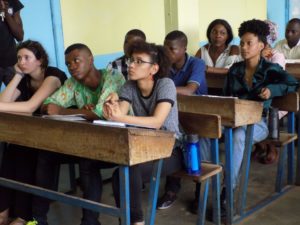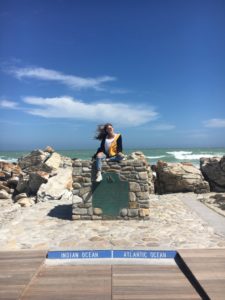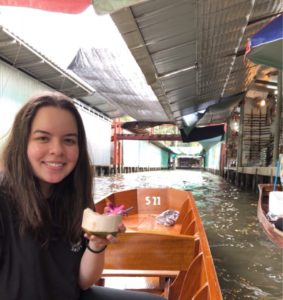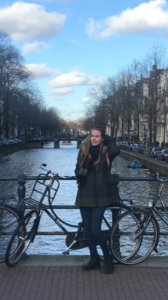Written by Isabella Antonelli ’20, Nha Le ’21, and Casey Trimm ’20
Studying abroad is one of the greatest opportunities students can have to completely immerse themselves in another culture and learn about the world outside of themselves. For some students, that means leaving The Hill, while for others that means coming to The Hill. We spoke with six students at Denison: three of whom are from the United States and studied in other countries (Iceland, Cameroon, and South Africa) and three students who are from abroad (China, Thailand, and The Netherlands) to compare their experiences of homesickness, culture shock, and strategies to feel at home wherever you are.
Students from the United States who Studied off of The Hill
Kevin Katz ‘20

Kevin Katz ‘20 studied abroad in Iceland through the Center for Ecological Living and Learning (CELL) from the beginning of February to the end of April of his junior year (2019).
He lived in Sólheimar, the only eco-village in Iceland, southeast of Reykjavík with one hundred residents. His program consisted of four U.S. students.
Sólheimar is a community that hosts people who have physical and mental disabilities. “It’s the idea of reverse integration. Rather than people who have disabilities having to get used to the idea of able-bodied people, they live in their own community. They’re not being ostracized, it’s to give them a sense of purpose and responsibility. They are very functioning people.”
The residents pay their own rent, have a job, and work for the community. The products they make, such as rugs and sweaters, get distributed to the larger Icelandic country.
“I got to see the power and impact that the community’s work had on the greater Icelandic community.” Katz lives in the Homestead (presently and the Fall 2018) at Denison. He describes Sólheimar feeling like the Homestead on a grander scale.
In terms of people and the culture, Katz describes having little culture shock. “Icelandic culture is not too different from the United States. I didn’t expect that and maybe I was shocked by how it didn’t feel different.”
He explains that this could be due to Iceland being one of the only Western countries to have not had an industrial revolution. “One day they were living in turf houses, and the next they had TVs.”
Iceland is so far north that in the winter when Katz arrived, there was sometimes as little as four hours of daylight. “You don’t really realize how dark it is until you’re in it.” Now, he sees the importance of sunrooms and Vitamin D supplements.
Coming back to the United State hit Katz even harder than when he left to Iceland. “I went from a country that is so nature oriented. I think I’m only now just getting over it.”
Ambar Deleon ‘20

Ambar Deleon ‘20 studied in Cameroon in her Spring 2019 semester through SIT Cameroon Development and Social Change.
She describes picking up day-to-day behaviors in Cameroon that have stuck with her now. “I was around a lot of people in Cameroon constantly. Everyone says hi and you see a lot of people acting communal in a way that you don’t see that here. Coming back, I feel weird just smiling at people.”
“I’m more sociable now and am more straightforward in the way I interact with people because that’s the way it was in Cameroon. There’s no subtleties, it’s just how it is.”
A small, but vital, form of culture shock was transportation for Deleon. “The way you had to get from place to place was funny, but frustrating. To hail down a taxi you had to shout out where you’re going and what you’re willing to pay. They would drive very slowly and you and everyone else would yell out where you are going.”
Deleon was not fluent in French and found the language barrier to be an expected challenge.
“I would mispronounce a lot of the places and they would have to stop and ask me.
French in Cameroon was far different than the French spoken in France and the French taught in the U.S. However, she recalls that people in Cameroon would be more lenient and understanding of any mispronunciations.
Deleon stayed with a host family made up of a grandmother, mother, brother, and sister. “I came to Denison an independent person, and then being at Denison — it was just me. I didn’t have to tell anyone what I was doing. In Cameroon, I thought I would want the family dynamic, but ended up not wanting that,” Deleon laughs. “I didn’t feel like I was meant to be in a family [during her time abroad.]”
The family gave Deleon space when she needed it, but also left her feeling “weird” because of unspoken expectations to be around the family.
Deleon most misses the food. “It was so amazing. I miss the fish. It was so soft and juicy that I thought it was chicken because it was so good. My host mom would make a peanut sauce soup with fish in it and beans and rice. The pineapple was always sweet, fruit is so different there.”
Coming back to the U.S, Deleon felt ready to come home. “It was sad because I was leaving and I didn’t know when I would see everyone again.”
“Everything is so loud in the U.S. But I remember seeing my family and being so happy.” Deleon recalls touching down in Miami and giving her family gifts from her months abroad.
Once she got home, she was left wondering “Now what do I do?” She had two weeks with her family before going back to Denison for the summer to do senior research.
Jane Scott ‘20

Jane Scott, a senior Psychology major from Charlottesville, Virginia studied in Cape Town, South Africa with Arcadia in the Fall 2018.
“I never really thought about culture shock like most people do. I kind of rolled with it. But reflecting back on it, the main thing that felt like culture shock was the inequality I saw in South Africa, specifically in Cape Town.”
Scott explained that the wealth gap in South Africa is the largest in the world.
“I had never seen such [extreme] poverty like I saw it there. Obviously you know it exists, but it’s different when you actually see it. I saw people who were living with families of ten people in what looked like metal boxes, and then you drive twenty minutes outside of the city and you saw these beachside mansions.”
It was something that jarred Scott who remembers seeing an incredible wealth gap in the U.S. between on her drive from her hometown back to Denison.
“I drive through Charleston, West Virginia on my way back to campus. On the left of the highway, I see Charleston as a big city with this gorgeous buildings. On the right side of the highway are trailer parks. To me, I would think how horrible that was because you can visually see the inequality.”
But since coming back from Cape Town, Scott now says nothing she sees is comparable to what she saw there.
“I wasn’t fully expecting it, but I knew there would of course be poverty partly because the apartheid was so recent. Nothing can be really fixed in twenty-five years. I had to live there with a sense of privilege that I was from America and the experiences that, that carries. Finding the balance of ‘where’s my place here,’ was a hard adjustment.”
She emphasizes the importance of feeling and acting like a guest in South Africa.
“I was there for five months and I wasn’t traveling around to other places the way you might if you were studying abroad in a place like Europe so I really got to know the country. It’s so important to be respectful of the fact that we are so privileged to be here [Cape Town.]”
When Scott came home in November of 2018, she returned with a new sense of appreciation for everything in her life.
“It’s cliche, but true.”
She experienced the tail-end of a drought that had hit Cape Town. Scott shared a house with other participants of her program. Her showers had to be two minutes and often involved cold water because there would not be enough time for the water to warm up.
Upon coming back to the U.S., Scott assumed she would want to take long hot showers because she would be able to for the first time in so long.
“I stood there and quickly realized that just because something is available to us, does not mean we need to do that. Just because we have a water supply does not mean we should be wasteful.”
Without realizing or noticing, Scott brought back things she had adapted to in Cape Town with her back home.
International Students who Study on The Hill
Xiaotong Yang ’22
Xiaotong Yang ‘22 is an international student from SuZhou, China studying mathematics and computer science at Denison.
Xiaotong first experienced the United States in high school when she was a part of an international program that brought students to the United States to get their high school diploma. She felt that this was a good chance for her to experience life in the United States and become acclimated to American society before coming to the U.S. for college.
Initially, Xiaotong was most surprised that people in America drink so much cold water.
“In China we usually drink hot water. But here, even in the winter, people just drink cold water. It’s not a shock, but it definitely surprised me with my first experience here,” said Xiaotong.
Coming to Granville changed her concept of home slightly. Her first couple of months in the United States were exciting because she was at a new school with a new life and host family. Once this initial excitement wore off after a couple weeks, she felt extremely homesick. She missed family, friends, and food back in China.
At her high school graduation, Xiaotong remembers her classmates’ parents attending, but hers couldn’t come. Instead, she invited her host family to come to her high school graduation, so that certainly helped. Her family in America includes her friends, teachers, and especially her advisor.
Since high school, she has become more used to the United States through studying at Denison. Xiatong advises international students facing homesickness to get involved on campus. She encourages them to make new friends and apply for a host family through Denison’s International Friendship Program. She advises to not hesitate to ask questions about school, classes, research, internships, and more. Even if the person asked may not be the right person, they may know someone who can ask and find out for you.
Araya Schroder ‘22

Araya is a biology major at Denison and from Thailand. As a sophomore, she does not feel like she has fully experienced living in America since she has only lived her for a short time. She considers Thailand to be more of her home as its where her support system and family is based.
Araya finds Granville to be a lot different than her home back in Thailand. “I’m originally from the city, so being around a lot of things happening at once is all I know. I kind of wanted to live in a smaller town to change my environment. I like Granville because you are in a calm environment. It’s a different environment for me to live in besides home. It also has shown me the type of environment I’d like to live at in the future,” said Schroder.
The first time Araya felt homesick was when she first came here and the initial excitement of orientation and meeting new people ended. She believes that homesickness is a normal thing that everyone experiences.
She emphasizes that is not the worst thing that you will face and to remember that it’s temporary. It’s just a part of life, and to help get over it, Araya advises to find a good support group through friends and teachers.
Araya encourages all students to be more open minded to everybody’s thoughts in order to become more aware of others and learn from their experiences.
“If somebody has a different idea that doesn’t align or agree with you, don’t shut it off. Be open to hearing why they think that. That’s how you learn in life. Hearing different people’s thoughts and opinions on things can broaden your experience and knowledge.”
Maren Kraak ‘22

Maren has discovered many differences between her home in Holland and the United States.
“Holland is a very open country that has been challenged with current politics. A lot of people I know keep to themselves. In the U.S., I had to get out of my comfort zone. America has many more conflicts with topics like race, sex, and gender, while Holland doesn’t have that as much. In America, I really try to respect everyone’s feelings toward different things.”
Maren has noticed a lot of differences between her life back home and the United States. A lot of Dutch people are very punctual, so Maren is always used to being on time. This is something she learned isn’t entirely the case at Denison, and it was something that threw her off at first.
“In Holland, everyone is very to themselves. Whereas here, you are on a small campus with very open and welcoming people. At first, I was wondering why everyone is in my business. This has grown to become something that I love.”
Maren has travelled and lived in a lot of different places in her country. If you live in the West, it is a very different atmosphere than living in the East. Coming to the United States, she found a lot of differences.
“I am not the representation of Holland. I am Dutch. I am one person from the Netherlands, but I do not stand for all the Dutch people in the world. I used to think, “Okay, this is an American. That means they are this way.” I learned that you can’t generalize people based on where they’re from. People thought I was a certain way because I was Dutch, but you can’t generalize.”
Sometimes, people confuse Maren for an American, therefore assuming she is not an international student. She said she is often generalized based on how she looks.
The first time Maren experienced homesickness was after a field hockey game when her parents were not there and everyone else’s were. At the beginning, it was hard for her to get over her homesickness, but she found that keeping in contact with her family more helps immensely. She believes that it’s all about finding a balance, and admits that at first it was really difficult.
Maren’s advice for students who are homesick is that they shouldn’t be afraid to reach out. Everyone, even U.S. students, get homesick.
“Stay open-minded. Listen to other people. Don’t just base your opinions off of assumptions. I think staying open-minded will broaden one’s horizon. It might be hard for you if you’re homesick, but you can and will get to a point where you can say that Denison is your home too. That’s when you can truly enjoy your college life as an international student.”
Conclusion
Whether you’re studying on or off The Hill, we all experience differences and moments of discomfort when placed in a new environment. We hope this article inspires empathy, while also helping you navigate difficulties abroad, either here on The Hill as an international student or away from The Hill as a student who has chosen to study off campus. When we achieve a deeper appreciation and understanding of others, we can better understand ourselves and the world around us.
